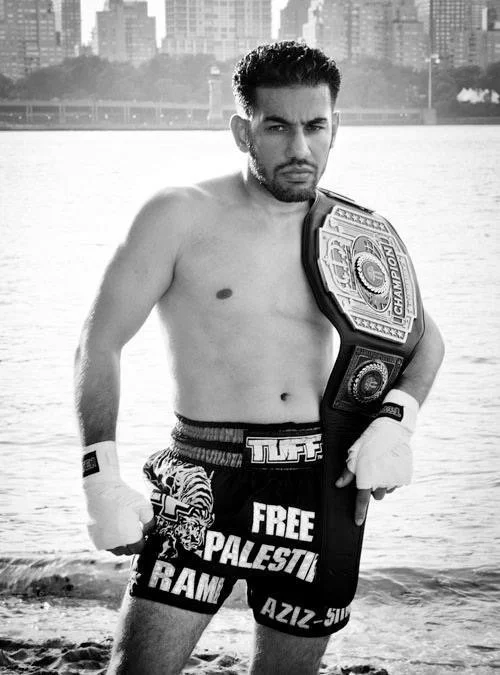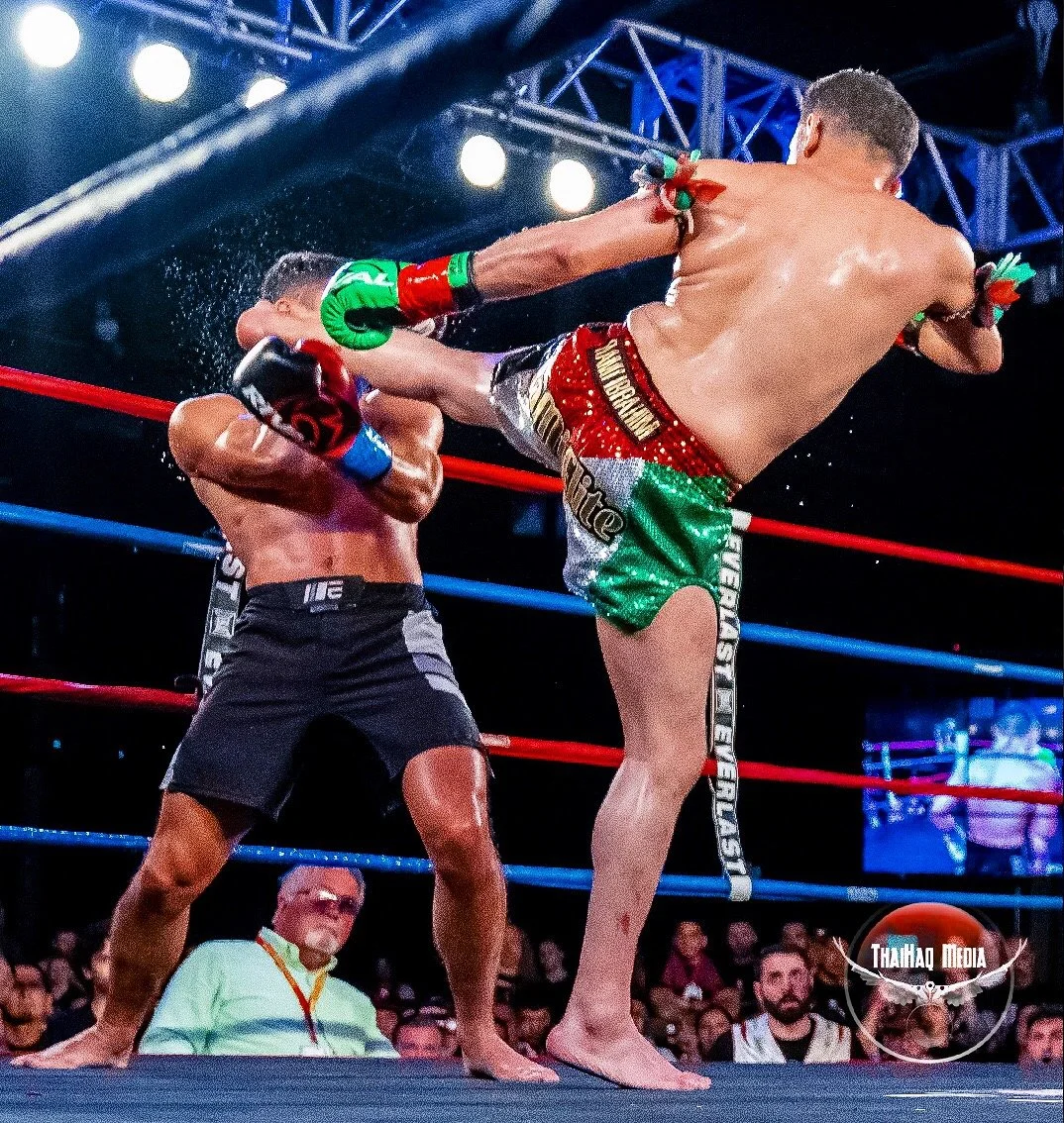The Son of Palestine: How One Philadelphia Fighter Blends Activism With A Memorable Martial Arts Career
Heather Tenzer
When he was only eight years old, Palestinian-American Rami Ibrahim arrived in Philadelphia from Kuwait and never left. Today, Ibrahim is best known for his career in Muay Thai and as a Palestine liberation activist. His fights have been broadcast on television, where he often has the word ‘Palestine’ emblazoned on his boxing gear. “I was always talking about Palestine, so [the sports world] started calling me ‘The Son of Palestine,’” Ibrahim explains.
Over the years, Ibrahim has earned multiple titles and awards as a professional athlete. He’s also Philadelphia’s first and only professional Muay Thai world champion. Muay Thai — or ‘Thai boxing’ also called the ‘Art of eight limbs’’— is a combat sport which originated in Thailand centuries ago. Fighters use their fists, elbows, knees and shins. In recent years, Muay Thai’s global popularity has exploded, leading it to become an Olympic sport in 2021.
But Ibrahim’s achievements aren’t limited to the ring. He’s also head coach of the United States’ Olympic Muay Thai team. Last week, he was awarded ‘Head Coach of the Year’ in Bangkok, Thailand, where he led Team USA to a victory at the largest Muay Thai tournament in the world, organized by the International Federation of Muay Thai Associations (IFMA). “Out of the 102 countries that participated, [Team USA] came in second place after Thailand,” Ibrahim says proudly.
In addition to working with the Olympic Muay Thai team, Ibrahim also owns and manages Rami Elite, a gym in Northeast Philadelphia), where he coaches local youth and adults in Muay Thai and Taekwondo. Many of Ibrahim’s students have gone on to become champions including his nephew, Ahmad Ibrahim, who won a coveted World Boxing Council title in 2020.
“This is a sign to me of what a fighter is. A person might get knocked out in a fight but it’s not the end of the world.”
Palestinian-American Rami Ibrahim, pictured above, is Philadelphia’s first and only professional Muay Thai world champion.
Ibrahim attributes his success to having a strong role model in his father who was born in Palestine in 1946.
“My dad might not be a fighter in the ring but he was a fighter in life. He lost so much. He was only 2-years-old [in 1948] when Israel invaded Palestine, and became Israel. He got to see the worst of genocide and murder, and he didn’t become depressed. He grew to become a successful Palestinian man with a positive life and a family,” says Ibrahim. “This is a sign to me of what a fighter is. A person might get knocked out in a fight but it’s not the end of the world. As long as the sun comes up the next day, life continues.”
Among his many achievements, Ibrahim is the longest active Muay Thai fighter in North America. In 2017, he was inducted into the New Jersey Martial Arts Hall of Fame for his contributions to Muay Thai as both an athlete and trainer. His proudest accomplishment, however, has been using his platform in the sports world to be an outspoken activist in support of Palestinian liberation.
But growing up in North Philadelphia in the early ‘90s, Ibrahim could never have foreseen his success. Having just arrived from Kuwait, Ibrahim recalls constantly getting into fights in his neighborhood. At the time, he says, the neighborhood was a tough place, and he was regularly bullied for his broken English and heavy accent.
A few days before Iraq’s August 1990 invasion of Kuwait ignited the first Gulf War, Ibrahim came to Philadelphia to visit his older brothers. He didn’t plan on being in the city long. But when war erupted back home, Ibrahim ended up staying on with his mother and five brothers.
“I’ve had fights broadcast live on TV and they would try to kick me out of the ring because I had a shirt on that read ‘Free Palestine.’”
Soon after, Ibrahim’s father, who had been manager of the Kuwaiti airport, fled Kuwait and joined his family in Philadelphia. Adjusting to life in Philadelphia was difficult. Back home, Ibrahim says, his father was wealthy. But “when the war happened, we fled and we lost everything,” he explains. “We went from being very rich to having to live in a tough neighborhood.”
“My father went from dealing with the kings and princes of the Middle East to having to work at a corner store in the ghetto. Every day he would find himself driving around for more than an hour on his way home from work because he was so deep in thought. He didn’t want to go home and look weak in front of his kids,” says Ibrahim.
“I was constantly getting into fights,” Ibrahim recalls. “I was getting picked on all the time. My brother suggested I go to martial arts school.” Following his brother’s advice, Ibrahim began studying Muay Thai. “It kept me off the street. They put me into the gym to keep me occupied with something that was positive in my life. It became my second family.”
In adulthood, Ibrahim has faced backlash for his activism. For many years, he was denied U.S. citizenship because he had been photographed burning an Israeli flag. And after becoming a professional athlete, Ibrahim discovered that he was constantly being censored. He tells Al-Bustan, “I’ve had fights broadcast live on TV and they would try to kick me out of the ring because I had a shirt on that read ‘Free Palestine.’”
During one fight, Ibrahim recalls wearing a shirt that read ‘Jesus is Palestinian.’
“I was walking into the ring, when security stopped me and told me that I had two minutes to change my outfit. I said: ‘Why?’ They said: ‘We can’t show it on TV. Otherwise, your fight is going to be scratched.’” In the end, Ibrahim wore the shirt inside out.
But attempts to censor Ibrahim continued.
“One day a promoter said: ‘Listen, Rami. I want you to come back and fight for us. We have only one condition: You have to stop talking about Palestine.’”
“I said: ‘Excuse me?!’”
“He said: ‘I’m Jewish. And I stand for Israel.’”
“I said, ‘Listen there is no way that you think it’s okay for me to stop talking about what’s happening to my people.’
“He said: ‘I guess this is not going to work out.’”
That wasn’t the only time promoters denied Ibrahim opportunities because of his activism. As Ibrahim became more vocal about Palestine, promoters started blacklisting him, he reports.
In 2014, when Israel bombed Gaza, killing between 2,125 and 2,310 Palestinians, Ibrahim was invited to fight at Mohican Sun Casino. He wore a boxing robe and boxing shorts emblazoned with the Palestinian flag. “That was a big message that more people got to see,” says Ibrahim. Today, Ibrahim is a promoter as well, running Freedom Fighter Promotions.
Throughout his career, Palestine has served as a powerful motivator and reminder for Ibrahim. Since obtaining U.S. citizenship, Ibrahim annually visits Silwad— near the West Bank city of Ramallah — where his family still owns 50 acres of land. For martial artists today, Ibrahim says it doesn’t matter if a fighter has all the resources, great teammates, a great coach, and is in shape. He tells Al-Bustan, “For you to be a strong and great fighter you have to have something bigger in life that you are fighting for. Throughout my career I wasn’t fighting for myself…I was fighting for every single Palestinian.”
***
Heather Tenzer is a Philadelphia based journalist and filmmaker. She has been supported by grants and fellowships from Yaddo Artist Residency, the Jerome Foundation, the New York State Council on the Arts, and the Queens Council on the Arts.



